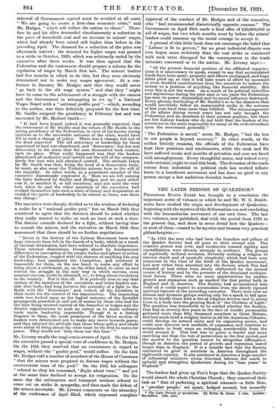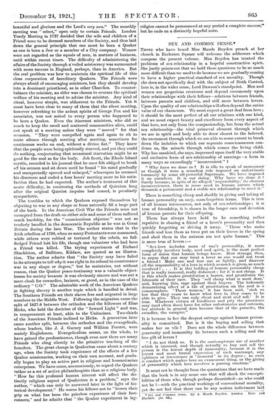THE LATER PERIODS OF QUAXERISM.* PROFESSOR REFITS JONES has brought
to a conclusion the important series of volumes in which he and Mr. W. C. Braith- waite have studied the origin and development of Quakerism, beginning with the mystics of the Reformation era and concluding with the humanitarian movement of our own time. The last two volumes, now published, deal with the period from 1725 to the present day, and show in some detail how the Quakers— or most of them—ceased to be mystics and became very practical philanthropists :- " In 1725 the men who had been the founders and pillars of the Quaker Society had all gone to their eternal rest. The creative period was over, and tendencies toward rigidity and crystallization were already strongly in evidence. The groups of mystically inclined sectaries, fervently seeking a religion of interior depth and of apostolic simplicity, which had been very numerous at the time of the birth of the Quaker movement, had now either been absorbed into the Society which Fox had founded or had either been slowly obliterated by the normal course of history and by the pressure of the dominant ecclesias- tical forces. There were no more opportunities for sudden growth and expansion such as marked the first period both in England and in America. The Society had accumulated into itself all it could expect to accumulate from the slowly ripened spiritual harvest of the preceding centuries. There were now no intense and dynamic groups waiting only for a spark to fall upon thorn to kindle them with a fire of religious fervour and to sweep them in a body into the growing flock of the Children of Light.' The question was henceforth to be settled whether the Society, that had in seventy-five years in the face of terrific persecution gathered more than fifty thousand members in Great Britain, and had made itself a weighty factor in all the American Colonies, could develop its inward unity and its organizing power, and could now discover new methods of expansion and continue to accumulate in fresh ways an enlarging membership from the world around it. This test was to prove a harder and more searching one than the test of persecution in the first period, and the answer to the question cannot be altogether affirmative, though in America the period of growth and expansion lasted longer than in England. It is a notable fact that the Society continued to grow in numbers in America throughout the eighteenth century. It also produced in America a large number of influential ministers whose itinerant labours did much to upbuild and strengthen Quakerism during its ' lean years' in
England.'" •
The leaders had given up Fox's hope that the Quaker Society would absorb the whole Christian Church ; they conceived their task as " that of perfecting a spiritual remnant—a little Zion, a ' peculiar people,' set apart, hedged around, but inwardly • The Later Periods of Quakerism. By Rufus Dd. Jones. 2 yob. London: Macmillan. [30e. net] beautiful and glorious and the Lord's very own." The monthly meeting was " select," open only to certain Friends. London Yearly Meeting in 1737 decided that the wife and children of a Friend were to be deemed members of the Society, and thus laid down the general principle that one must be born a Quaker as one is born a Jew or a member of a City company. Women were not regarded as the equals of men, in matters of business, until within recent times. The difficulty of administering the affairs of the Society through t‘veiled aristocracy was surmounted with more success in England, perhaps, than in America. But the real problem was how to maintain the spiritual life of this close corporation of hereditary Quakers. The Friends were always afraid of encouraging ministers, lest they should develop into a dominant priesthood, as in other Churches. To counter- balance the minister, an elder was chosen to oversee the spiritual welfare of his meeting and to advise the minister. Any kind of ritual, however simple, was abhorrent to the Friends. Yet it must have been clear to many of them that the silent meeting, however refreshing to the ardent spirits of George Fox and his associates, was not suited to every person who happened to be born a Quaker. Even the itinerant ministers, who did so much to keep the small and scattered communities alive, could not speak at a meeting unless they were " moved " for that occasion. " They were compelled again and again to sit in mute silence through meeting after meeting, sometimes for continuous weeks on end, without a divine fiat." They knew that the people were being spiritually starved, and yet they could do nothing, conjecturing that occasional starvation might be as good for the soul as for the body. Job Scott, the Rhode Island mystic, recorded in his journal that he once felt obliged to break off his sermon and sit down until he found " his mind gradually and unexpectedly opened and enlarged," whereupon he resumed his discourse and ended a four hours' meeting more to his satis- faction than he had expected. The author's treatment of this acute difficulty, in continuing the methods of Quietism long after the original Quietist impulse had ceased, is peculiarly sympathetic.
The troubles to which the Quakers exposed themselves by objecting to war in any shape or form naturally fill a large part of the book. In the American Civil War the Friends were not exempted from the draft on either side and some of them suffered much hardship, for the " conscientious objector " was not so tenderly handled in the democratic Republic as he was in Great Britain during the late War. The author states that in the Irish rebellion of 1798, when so many Protestants were massacred, while others were robbed or tortured by the rebels, no full- fledged Friend loit his life, though one volunteer who had been a Friend was killed. The trying experiences of Richard Shackleton, of Ballitore, Kildare, are quoted as an illustra- tion. The author admits that " the Society may have failed in its attempts to tell why it was right in its refusal to countenance war in any shape or degree," but he maintains, not without reason, that the Quaker peace-testimony was a valuable object- lesson for society because it was obviously sincere and was not a mere cloak for cowardice, laziness, or greed, as in the case of the ordinary " C.O." The admirable work of the American Quakers in fighting slavery is another topic which is handled in detail. The Southern Friends set their slaves free and migrated in large numbers to the Middle West. Following the migration came the split of 1827-8 between the orthodox and the followers of Elias
Hicks, who held the doctrine of the " Inward Light " and was, in temperament at least, akin to the Unitarians. Two-thirds of the American Friends inclined to Hicks. A generation later
came another split, between the orthodox and the evangelicals, whose leaders, like J. J. Gurney and William Forster, were
mainly Englishmen. Evangelicalism seems, on the whole, to have gained the predominance, though even now there are many Friends who cling silently to the primitive teaching of the founders. The great change in Quakerism came about a century ago, when the Society took cognizance of the efforts of a few Quaker missionaries, working on their own account, and gradu- ally began to play an active part in religious and humanitarian
enterprises. We have come, unconsciously, to regard the Quakers rather as a set of active philanthropists than as a religious body.
" How far this profound human interest will affect the dis-
tinctly religious aspect of. Quakerism is a problem," says the author, " which can only be answered later in the light of his-
torical development." He warns his fellows not to " loosen their grip on what has been the priceless experience of their fore-
runners," and he admits that " the Quaker experiment in lay- Blackett. [4s. ed.j
religion cannot be pronounced at any period a complete success," but he ends on a distinctly hopeful note.



































 Previous page
Previous page